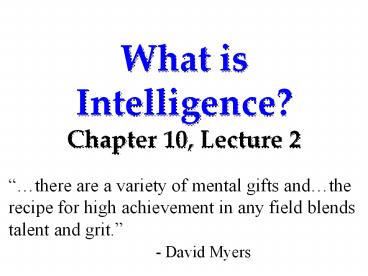What is Intelligence? Chapter 10, Lecture 2 - PowerPoint PPT Presentation
Title:
What is Intelligence? Chapter 10, Lecture 2
Description:
Intrinsic Motivation: ... Components Component Description Perceive emotion Recognize emotions in faces, ... Chapter 10, Lecture 2 ... – PowerPoint PPT presentation
Number of Views:327
Avg rating:3.0/5.0
Title: What is Intelligence? Chapter 10, Lecture 2
1
What is Intelligence?Chapter 10, Lecture 2
there are a variety of mental gifts
andthe recipe for high achievement in any field
blends talent and grit. - David Myers
2
Intelligence
Do we have an inborn general mental capacity
(intelligence)? If so, can we quantify this
capacity as a meaningful number?
3
What is Intelligence?
Intelligence (in all cultures) is the ability to
learn from experience, solve problems, and use
our knowledge to adapt to new situations.
In research studies, intelligence is whatever the
intelligence test measures. This tends to be
school smarts.
4
Intelligence Ability or Abilities?
Have you ever thought that since peoples mental
abilities are so diverse, it may not be
justifiable to label those abilities with only
one word, intelligence?
5
General Intelligence
The idea that general intelligence (g) exists
comes from the work of Charles Spearman
(1863-1945) who helped develop the factor
analysis approach in statistics.
Athleticism, like intelligence, is many things
6
General Intelligence
Spearman proposed that general intelligence (g)
is linked to many clusters that can be analyzed
by factor analysis.
For example, people who do well on vocabulary
examinations do well on paragraph comprehension
examinations, a cluster that helps define verbal
intelligence. Other factors include a spatial
ability factor, or a reasoning ability factor.
7
For an example of factor analysis, look at
Handout 10-3
Correlations of Twelve MPI Items to Neuroticism
and Extraversion
N
E
N
E
1.
0.75
0.01
7.
0.01
0.48
2.
0.74
-0.06
8.
0.04
0.59
3.
0.71
-0.09
9.
-0.06
0.59
4.
0.58
0.02
10.
-0.04
0.49
5.
0.58
-0.06
11.
-0.02
0.68
6.
0.63
0.09
12.
0.09
0.64
8
Contemporary Intelligence Theories
Howard Gardner (1983, 1999) supports the idea
that intelligence comes in multiple forms.
Gardner notes that brain damage may diminish one
type of ability but not others.
People with savant syndrome excel in
abilities unrelated to general intelligence.
9
Howard Gardner
Gardner proposes eight types of intelligences and
speculates about a ninth one existential
intelligence. Existential intelligence is the
ability to think about the question of life,
death and existence.
p.408
10
Robert Sternberg
Sternberg (1985, 1999, 2003) also agrees with
Gardner, but suggests three intelligences rather
than eight.
- Analytical Intelligence Intelligence that is
assessed by intelligence tests. - Creative Intelligence Intelligence that makes us
adapt to novel situations, generating novel
ideas. - Practical Intelligence Intelligence that is
required for everyday tasks (e.g. street smarts).
11
Intelligence and Creativity
Creativity is the ability to produce ideas that
are both novel and valuable. It correlates
somewhat with intelligence. (convergent vs.
divergent?)
- Expertise A well-developed knowledge base.
- Imaginative Thinking The ability to see things
in novel ways. - A Venturesome Personality A personality that
seeks new experiences rather than following the
pack. - Intrinsic Motivation A motivation to be creative
from within. - A Creative Environment A creative and supportive
environment allows creativity to bloom.
12
Emotional Intelligence
Emotional intelligence is the ability to
perceive, understand, and use emotions (Salovey
and others, 2005). The test of emotional
intelligence measures overall emotional
intelligence and its four components.
13
Emotional Intelligence Components
Component Description
Perceive emotion Recognize emotions in faces, music and stories
Understand emotion Predict emotions, how they change and blend
Manage emotion Express emotions in different situations
Use emotion Utilize emotions to adapt or be creative
14
Emotional Intelligence Criticism
Gardner and others criticize the idea of
emotional intelligence and question whether we
stretch this idea of intelligence too far when we
apply it to our emotions.
15
Homework
Read p.415-422
Multiple Intelligence Theory Assignment (10 pts,
due 1/9)
Although people have different
abilities, intelligence is a concept and not a
thing. - David Myers
How does this relate to reification???

